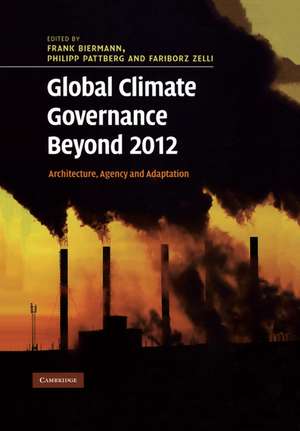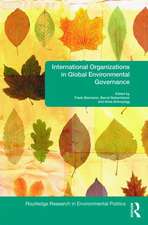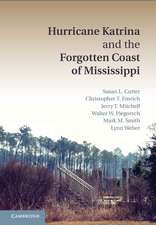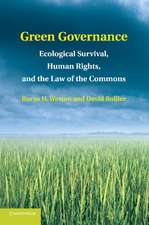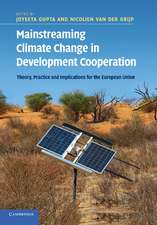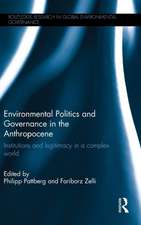Global Climate Governance Beyond 2012: Architecture, Agency and Adaptation
Editat de Frank Biermann, Philipp Pattberg, Fariborz Zellien Limba Engleză Paperback – 10 noi 2010
| Toate formatele și edițiile | Preț | Express |
|---|---|---|
| Paperback (1) | 436.55 lei 43-57 zile | |
| Cambridge University Press – 10 noi 2010 | 436.55 lei 43-57 zile | |
| Hardback (1) | 1000.64 lei 43-57 zile | |
| Cambridge University Press – 17 feb 2010 | 1000.64 lei 43-57 zile |
Preț: 436.55 lei
Nou
Puncte Express: 655
Preț estimativ în valută:
83.53€ • 87.45$ • 69.12£
83.53€ • 87.45$ • 69.12£
Carte tipărită la comandă
Livrare economică 07-21 aprilie
Preluare comenzi: 021 569.72.76
Specificații
ISBN-13: 9780521180924
ISBN-10: 0521180929
Pagini: 350
Dimensiuni: 170 x 244 x 19 mm
Greutate: 0.56 kg
Editura: Cambridge University Press
Colecția Cambridge University Press
Locul publicării:Cambridge, United Kingdom
ISBN-10: 0521180929
Pagini: 350
Dimensiuni: 170 x 244 x 19 mm
Greutate: 0.56 kg
Editura: Cambridge University Press
Colecția Cambridge University Press
Locul publicării:Cambridge, United Kingdom
Cuprins
List of contributors; Preface; List of abbreviations; 1. Global climate governance beyond 2010: an introduction Frank Biermann, Philipp Pattberg and Fariborz Zelli; Part I. Architecture: 2. The architecture of global climate governance: setting the stage Frank Biermann, Fariborz Zelli, Philipp Pattberg and Harro van Asselt; 3. The consequences of a fragmented climate change governance architecture: a policy appraisal Fariborz Zelli, Frank Biermann, Philipp Pattberg and Harro van Asselt; 4. Environmental effectiveness and economic consequences of fragmented versus universal regimes: what can we learn from model studies? Andries Hof, Michel den Elzen and Detlef van Vuuren; 5. Developing the international carbon market beyond 2012: options and the cost of delay Christian Flachsland, Robert Marschinski, Ottmar Edenhofer, Marian Leimbach and Lavinia Baumstark; 6. The overlap between the UN climate regime and the World Trade Organization: lessons for climate governance beyond 2012 Fariborz Zelli and Harro van Asselt; 7. An architecture for long-term climate change: North–South cooperation based on equity and common but differentiated responsibilities Harald Winkler; 8. Shaping the architecture of future climate governance: perspectives from the South Manish Kumar Shrivastava and Nitu Goel; Part II. Agency: 9. Agency in global climate governance: setting the stage Philipp Pattberg and Johannes Stripple; 10. The role and relevance of networked climate governance Philipp Pattberg; 11. Carbon market governance beyond the public–private divide Johannes Stripple and Eva Lövbrand; 12. A staged sectoral approach for climate mitigation Michel den Elzen, Andries Hof, Jasper van Vliet and Paul Lucas; 13. Technological change and the role of non-state actors Knut H. Alfsen, Gunnar S. Eskeland and Kristin Linnerud; Part III. Adaptation: 14. Global adaptation governance: setting the stage Frank Biermann and Ingrid Boas; 15. Costs, benefits and interlinkages between adaptation and mitigation Andries Hof, Kelly de Bruin, Rob Dellink, Michel den Elzen and Detlef van Vuuren; 16. Global adaptation governance: the case of protecting climate refugees Frank Biermann and Ingrid Boas; 17. Global adaptation governance beyond 2012: developing country perspectives Jessica Ayers, Mozaharul Alam and Saleemul Huq; 18. Shaping future adaptation governance: perspectives from the poorest of the poor Anne Jerneck and Lennart Olsson; 19. Conclusions: options for effective climate governance beyond 2012 Frank Biermann, Philipp Pattberg and Fariborz Zelli; Index.
Descriere
A cutting-edge analysis of the key issues and policy options facing future global climate governance, written by leading world experts.
